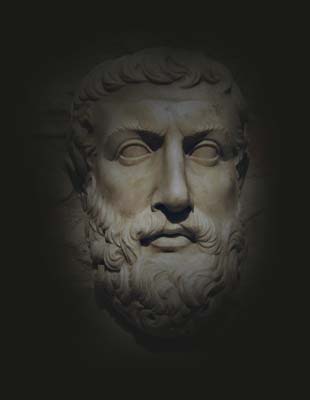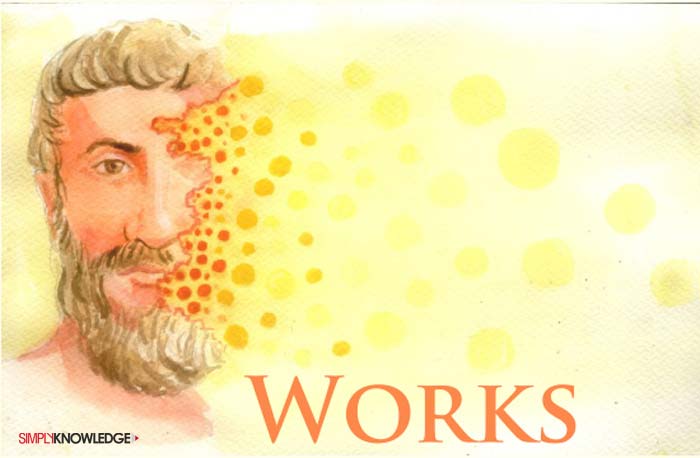



Introduction

“You must learn all things, both the unshaken heart of persuasive truth, and the opinions of mortals in which there is no true warranty,” said Parmenides of Elea. Though most works of Parmenides of Elea perished over the last 2500 years, this pre-Socratic thinker laid foundations of Western psychology, through these words.
Later thinkers such as Socrates and Plato praised Parmenides while Aristotle dubbed him as “stark mad” after studying his works. Either way, Parmenides was expounding that the human perception about reality in the existent, physical world is mere illusion. The absolute reality lies on the ‘One’- an omnipotent, unchanging force that can neither be created nor destroyed. That motion and change are simple human illusions of the real static, eternal reality. Parmenides also espoused, truth cannot be learned through sensory perception but only via pure reason- termed in modern psychology as ‘logic’.
Birth
Precise details about Parmenides’ birth and life are unavailable. Information about this thinker available today is garnered from writings of other, later era thinkers including Plato and a few other historians.
Parmenides was born around 515BC in the Greek colony of Elea, now in southern Italy. Historians such as Diogenes Laertius claim he was born between 540BC and 510BC but this is countered by the later thinker, Plato.
Parmenides, accompanied by his success and student Zeno, met Socrates in Athens, says Plato. Records by Plato claim, Parmenides was around 65 years old at the time while Zeno was about 40 and Socrates was “very young” meaning possibly in his late 20s or early 30s. Hence, the birth date of Parmenides of 515BC is consistent and generally accepted to date.
Life

Writings by historian Diogenes Laertius and Plato state, Parmenides was a student of Xenophanes of Colophon who lived between 570BC and 480BC. The concepts of logic and an omnipotent force or ‘One’, a sort of god, were teachings of Xenophanes that were propagated by Parmenides.
Parmenides denied the reality or the possibility of change as part of his psychology, termed ‘Monist’ or revolving around a single apex. His major contribution was the method of reasoned proof for assertions of truth.
Parmenides posed an unprecedented challenge in the history of Western thought that paved way for enquiries of subsequent thinkers including Empedocles, Anaxagoras and Democritus. The intellectual quest on the basis of Parmenides thinking continues till date. Parmenides is called the ‘Father of Monist Thinking’, for founding a school of thought that bases its hypothesis and teachings on a single power. He is also the founder of the Eleatic School in ancient Greek psychology.
Death

Due to absence of proper records, the death of Parmenides is not documented. However, historian Diogenes Laertius deduced, Parmenides of Elea passed away due to old age in 450BC.
Works

From the 150 lines of his 3,000 line poem called ‘On Nature’ that have survived over 25 centuries, Parmenides narrates his imagined meeting with a goddess or the ‘One’ who reigns supreme over the universe. He tells the goddess: “No mortal may surpass thee in knowledge”. Thus, Parmenides tells himself to understand the fallacious sentiments of mortals and how they perceive things. The poem narrates of the goddess telling humans to distinguish between two forms. “One of which they should have left out, and that is where they go astray from the truth. They have assigned an opposite substance to each, and marks distinct from one another. To the one they allot the fire of heaven, light, thin, in every direction the same as itself, but not the same as the other. The other is opposite to it, dark night, a compact and heavy body.”
Since “all things have been named light and night,” Parmenides asserts his conviction that they are not separated. There is only one single, unchangeable whole, which at the same time contains light and dark, “everything is full at once of light and dark night, both equal, since neither has anything to do with the other.”
Psychology of Paramenides | 6 Comments >>
6 Comments
Thanks for another wonderful post. Where else could anybody get that type of information in such an ideal way of writing? I have a presentation next week, and I’m on the look for such information.
Excellent brief and this article helped me alot. Say thank you I looking for your information and my seotons.
My brother suggested I might like this blog. He was entirely right. This post actually made my day. You cann't imagine just how much time I had spent for this info! Thanks!
Thanks for taking the time to discuss this, I feel strongly about it and adore finding out far more on this topic. If achievable, as you gain knowledge, would you mind updating your weblog with far more facts? Its extremely helpful for me.
Oh my goodness! an amazing article dude. Thanks Nevertheless I am experiencing subject with ur rss . Don't know why Unable to subscribe to it. Is there anybody getting an identical rss problem? Anybody who knows kindly respond. Thnkx
Leave Comment
Your email address will not be published. Required fields are marked.



Thank you a lot for sharing this with all people.